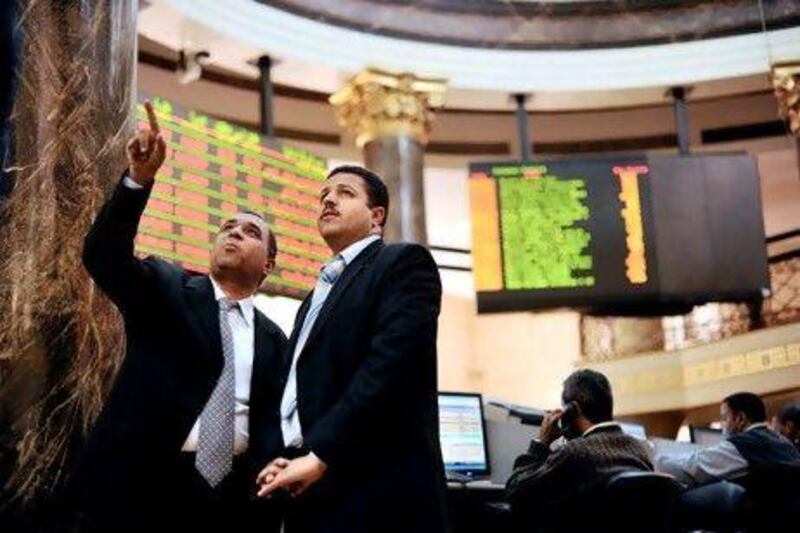Dubai and Egypt stock exchanges are in talks to enforce a dual listing framework designed to enable investors to gain access to shares in major companies on both markets.
More Business news: Editor's pick of today's headlines
Last Updated: May 16, 2011
Sales drop at Emaar a year after Burj triumph Emaar reported a 79 per cent drop in home sales in the first quarter. Read article
Bahrain moves to repair the damage Bahrain's state of emergency will end a fortnight earlier than planned but industry experts are still unconvinced that the Gulf's smallest economy will regain investors' confidence. Read article
Start your bids, racing fans in Dubai asked Stock cars used in the defunct Speedcar racing series in Dubai are hitting the auction block - with video. Read article
A day in the life of a Dubai trader Industry Insights // An insight into the volatility and trading on the regional bourses, following Marwan Shurrab, the chief trader at Dubai-based Gulfmena Investments. Read article
Du set to maintain its pace with subscribers Du, the second telecoms operator in the country, is expected to continue gaining mobile subscribers from Etisalat which should bode well for revenues, Dubai-based Al Mal Capital said. Read article
[ More Business ]
It represents the latest attempt by the exchanges to boost liquidity as both markets struggle to attract sizeable volumes.
Essa Kazim, the managing director and CEO of the Dubai Financial Market (DFM) and the chairman of Borse Dubai, the owner of the DFM, said the emirate's market was "considering a memorandum of understanding" with the Egyptian Exchange to enforce a dual listing framework where companies from both exchanges would also list shares, or global depository receipts (GDRs), on the other market. GDRs are like shares that provide companies with access to another exchange.
The benefit comes from arbitrage, or selling a company's stocks from one exchange to another to take advantage of differences in value between the markets.
"Undoubtedly, having the flexible framework in place that allows companies to list shares … will enable us to list as much as possible of these companies in the future," said Mohammed Abdulsalam, the chairman of the Egyptian Exchange (EGX).
He said a link between the markets could prompt some of Dubai's property companies to go for a dual listing on the EGX and major companies from Cairo's food industries and services sector to list on the Dubai market.
DFM Company is now among the worst-performing shares on its own exchange after falling by almost a fifth since the start of the year. Similarly, the Egyptian Exchange stands out as the world's worst-performing index so far this year, with EGX 30 having lost about 30 per cent since the beginning of the year. Some of Cairo's top companies, including Orascom Telecom, Orascom Construction Industries and EFG-Hermes, are already listed on the London Stock Exchange as GDRs, but have slumped in value in the aftermath of the revolution in Egypt that brought much of the economy to a halt.
At the height of the property boom in 2006, when liquidity was plentiful and daily volumes on the DFM climbed as high as 1.5 billion, shares in DFM Company had also reached about Dh7 each. But heavyweight banking and property stocks have been most acutely hit by the economic downturn as access to capital dried up and debts increased.
Trading volumes on the emirate's stock exchange now often struggle to breach the 100 million mark a day. The DFM, which is 11 years old, became a public company in 2006 after selling 20 per cent of its shares to the public.
Following its initial public offering, the Dubai Government retained the remaining 80 per cent of DFM Company through Borse Dubai.
Yesterday, shares in DFM Company declined 1.6 per cent to Dh1.25, with 7.5 million shares changing hands. Egyptian shares have hovered at about two-year lows after the EGX 30 index was suspended for almost two months at the height of nationwide protests that led to the toppling of Hosni Mubarak, the former president.
"It would be much better for investors to trade on a different platform than Egyptian market," said Noran Ali, an analyst at CI Capital, based in Cairo.
"We're into a transitionary period and the market is not trading very well at the moment."Listing shares of Egyptian companies elsewhere may provide another outlet for the government to garner investment into the country, she said.






